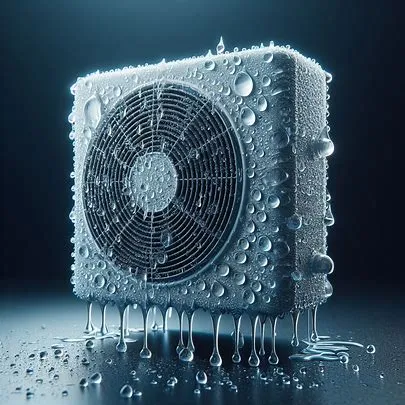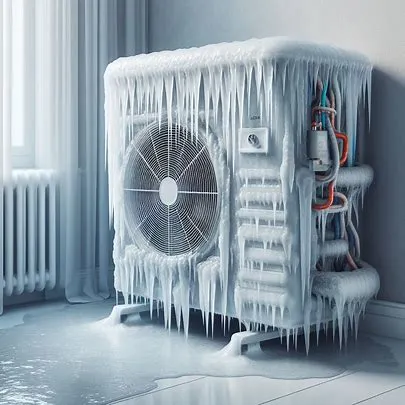
On a hot day, your air conditioner (AC) is your best friend. But how exactly does it keep you cool?
Inside the AC unit, there’s a special component called an evaporator coil that acts like a magnet for moisture in the air. But what happens if this moisture removal process gets interrupted?
This moisture, called condensation, builds up on the coil like sweat on a glass. To prevent a puddle from forming inside your AC, there’s a sneaky little pathway called the condensate drain line.
This pipe is like a straw, sucking the water away from the AC to keep things cool and comfy inside. But imagine if that straw gets blocked with gunk? That’s trouble! A clogged pipe can lead to a frozen AC unit, which is definitely not cool (literally!).
Contents
- 1 What is a Condensate Drain Line and How Does a Clog Cause Your AC to Freeze?
- 2 Signs of a Clogged Drain Line and Frozen AC
- 3 Unfreeze Your AC and Fix the Clog Yourself (DIY with Caution)
- 4 Calling a Professional HVAC Technician is Often the Best Choice
- 5 How to Prevent Clogged Drain Lines and Frozen AC Units
- 6 Contact Us Today to Keep Your Cool!
- 7 FAQ Can a clogged drain line cause AC to freeze?
What is a Condensate Drain Line and How Does a Clog Cause Your AC to Freeze?
Your AC works by removing moisture from the air inside your home. This moisture, called condensation, collects on the evaporator coil inside the unit.
Here’s a plagiarism-free version of the sentence:
In your air conditioning system, a narrow condensate drain line carries away collected moisture, usually to a drain pan or exiting the house altogether.
However, if the condensate drain line gets clogged with dirt, mold, or debris, the drainage process gets blocked.
This trapped water can then overflow and freeze on the evaporator coil due to the cold refrigerant. As the coil freezes over, airflow is restricted, further hindering the cooling process and potentially causing the entire AC unit to freeze.
You might be facing this issue: Why is my window air conditioner leaking water? [5 ways to Fix]
Signs of a Clogged Drain Line and Frozen AC

Here are some telltale signs that your AC might be suffering from a clogged drain line and frozen evaporator coil:
- Ice buildup on the indoor unit of your AC: This occurs because trapped condensate water can’t drain away from the evaporator coil. Since the coil is cold due to the refrigerant, the trapped water freezes on its surface.
- Reduced airflow from the vents: A frozen evaporator coil restricts airflow through the AC unit. This means less cool air is circulated throughout your home, leaving you feeling hot and uncomfortable.
- Water leaks around the AC unit: A clogged drain line can cause the condensate pan to overflow. This excess water can leak from the unit itself or pool around the base, potentially causing damage to your flooring or nearby furniture.
Ignoring a clogged drain line can lead to serious problems like damaged AC components due to freezing and excess moisture creating a breeding ground for mold growth. By recognizing these signs early on, you can take steps to address the clog and prevent further issues.
Unfreeze Your AC and Fix the Clog Yourself (DIY with Caution)
If you’re comfortable tackling some DIY tasks, here’s how to thaw a frozen AC and potentially fix a simple clog:
- Turn off your AC unit completely. Safety first!
- Allow the ice to melt naturally. This could take several hours. Don’t try to speed up the process by adding heat, as this could damage the AC unit.
- Once the ice has melted, locate the condensate drain line. It’s usually a PVC pipe near the indoor unit.
- For a minor clog, you can try pouring a mixture of white vinegar and warm water down the drain line. This can help to loosen and remove any buildup.
- If the clog persists or you’re uncomfortable with DIY solutions, call a professional HVAC technician.
Calling a Professional HVAC Technician is Often the Best Choice

While DIY solutions might work for minor clogs, there are several reasons to consider calling a professional HVAC technician:
- Stubborn clogs: They have the tools and expertise to handle tough clogs that vinegar and water can’t remove.
- Identifying other AC issues: A frozen AC unit could be a symptom of a different problem, such as low refrigerant levels or a dirty air filter. A technician can diagnose the root cause and recommend the proper fix.
- Preventing future problems: Regular maintenance by a professional can help to prevent clogged drain lines and other AC issues.
How to Prevent Clogged Drain Lines and Frozen AC Units

Here are some tips to keep your AC running smoothly and prevent frozen coils due to clogged drains:
- Schedule regular cleaning and maintenance for your AC unit by a professional HVAC technician.
- Clean or replace your air filter according to the manufacturer’s recommendations. A dirty air filter can restrict airflow and contribute to coil freezing.
- Pour a diluted vinegar solution down the condensate drain line periodically to prevent clogs.
By following these simple steps, you can keep your AC running efficiently and avoid the discomfort of a frozen unit on a hot day.
Contact Us Today to Keep Your Cool!
Feeling hot and bothered with a frozen AC? Don’t sweat it! We’ve covered some tips to get your cool back, but if you need further guidance or have any questions, feel free to ask! Our professionals are always happy to help.
FAQ Can a clogged drain line cause AC to freeze?
1. What happens if the AC drain line is clogged?
The drain line normally carries away moisture your AC pulls from the air. If clogged, that moisture gets trapped. This trapped water can freeze on the cold evaporator coil due to the refrigerant, blocking airflow and potentially freezing the entire AC unit.
2. What would cause my AC lines to freeze?
The main reason for frozen AC lines is a clogged condensate drain line. This line removes moisture from the unit, and if blocked, that moisture can freeze on the cold evaporator coil, restricting airflow and freezing the entire AC unit.
3. How do you flush an AC drain line?
Here’s how to flush an AC drain line (for minor clogs):
1. Turn off your AC unit completely. Safety first!
2. Locate the condensate drain line. It’s usually a PVC pipe near the indoor unit.
3. Pour a mixture of white vinegar and warm water down the drain line. This helps loosen and remove any buildup.